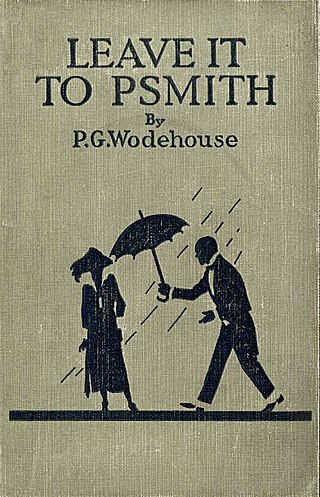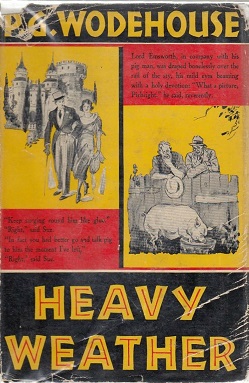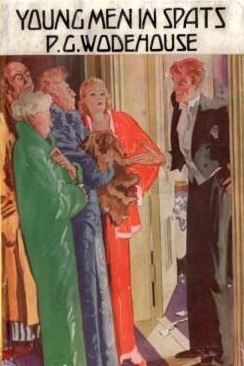Blandings Castle is a recurring fictional location in the stories of British comic writer P. G. Wodehouse, being the seat of Lord Emsworth, home to many of his family and the setting for numerous tales and adventures. The stories were written between 1915 and 1975.
Clarence Threepwood, 9th Earl Emsworth, commonly known as Lord Emsworth, is a recurring fictional character in the Blandings Castle series of stories by British comic writer P. G. Wodehouse. He is the amiable and somewhat absent-minded head of the large Threepwood family. Longing for nothing more than to talk to his prize pig, Empress of Blandings, or potter peacefully in the idyllic gardens of Blandings Castle, he must frequently face the unpleasant reality of his domineering sisters and familial duties.

Uncle Dynamite is a novel by P. G. Wodehouse, first published in the United Kingdom on 22 October 1948 by Herbert Jenkins, London and in the United States on 29 November 1948 by Didier & Co., New York. It features the mischievous Uncle Fred, who had previously appeared in Uncle Fred in the Springtime (1939).
Frederick Altamont Cornwallis Twistleton, 5th Earl of Ickenham, commonly known as Uncle Fred, is a fictional character who appears in comedic short stories and novels written by P. G. Wodehouse between 1935 and 1961. An energetic and mischievous old chap, his talent for trouble is the bane of his nephew Pongo Twistleton's life.

Summer Lightning is a novel by P. G. Wodehouse, first published in the United States on 1 July 1929 by Doubleday, Doran, New York, under the title Fish Preferred, and in the United Kingdom on 19 July 1929 by Herbert Jenkins, London. It was serialised in The Pall Mall Magazine (UK) between March and August 1929 and in Collier's (US) from 6 April to 22 June 1929.
Rupert J. Baxter is a fictional character in the Blandings stories by P. G. Wodehouse. Often called the Efficient Baxter, he is Lord Emsworth's secretary, and an expert on many things, including Egyptian scarabs. He invariably wears his rimless spectacles, suspects everyone of being an impostor, and is, as his epithet suggests, extremely efficient.

Leave It to Psmith is a comic novel by English author P. G. Wodehouse, first published in the United Kingdom on 30 November 1923 by Herbert Jenkins, London, England, and in the United States on 14 March 1924 by George H. Doran, New York. It had previously been serialised, in the Saturday Evening Post in the US between 3 February and 24 March 1923, and in the Grand Magazine in the UK between April and December that year; the ending of this magazine version was rewritten for the book form.

Empress of Blandings is a fictional pig, featured in many of the Blandings Castle novels and stories by P. G. Wodehouse. Owned by the doting Lord Emsworth, the Empress is an enormous black Berkshire sow, who wins many prizes in the "Fat Pigs" class at the local Shropshire Agricultural Show, and is the subject of many plots and schemes, generally involving her kidnap for various purposes. In 2005 Hall & Woodhouse, the Dorset-based Brewers of Badger beer, named a public house in Hampshire in honour of the Empress.

Heavy Weather is a novel by P. G. Wodehouse, first published in the United States on 28 July 1933 by Little, Brown and Company, Boston, and in the United Kingdom on 10 August 1933 by Herbert Jenkins, London. It had been serialised in The Saturday Evening Post from 27 May to 15 July 1933.

Young Men in Spats is a collection of short stories by P. G. Wodehouse, first published in the United Kingdom on 3 April 1936 by Herbert Jenkins, London, then in the United States with a slightly different selection of stories on 24 July 1936 by Doubleday, Doran, New York.

Uncle Fred in the Springtime is a novel by P. G. Wodehouse, first published in the United States on 18 August 1939 by Doubleday, Doran, New York, and in the United Kingdom on 25 August 1939 by Herbert Jenkins, London.

Pigs Have Wings is a novel by P. G. Wodehouse, which first appeared as a serial in Collier's Weekly between 16 August and 20 September 1952. It was first published as a book in the United States on 16 October 1952 by Doubleday & Company, New York, and in the United Kingdom on 31 October 1952 by Herbert Jenkins, London. It is the seventh novel set at Blandings Castle.

A Pelican at Blandings is a novel by P. G. Wodehouse, first published in the United Kingdom on 25 September 1969 by Barrie & Jenkins, London, and in the United States on 11 February 1970 by Simon & Schuster, Inc., New York, under the title No Nudes Is Good Nudes.
"The Crime Wave at Blandings" is a short story by P. G. Wodehouse that first appeared in the United States in two parts, in the October 10 and October 17, 1936 editions of the Saturday Evening Post, and in the United Kingdom in the January 1937 issue of the Strand. It was included in the collection Lord Emsworth and Others (1937), and provided the title to the U.S. equivalent of that collection.
"Pig-Hoo-o-o-o-ey" is a short story by P. G. Wodehouse, which first appeared in the United States in the 9 July 1927 issue of Liberty, and in the United Kingdom in the August 1927 Strand. Part of the Blandings Castle canon, it features the absent-minded peer Lord Emsworth, and was included in the collection Blandings Castle and Elsewhere (1935), although the story takes place sometime between the events of Leave It to Psmith (1923) and Summer Lightning (1929).
"Company for Gertrude" is a short story by P. G. Wodehouse, which first appeared in the United Kingdom in September 1928 in Strand, and in the United States in October 1928 in Cosmopolitan. Part of the Blandings Castle canon, it features the absent-minded peer Lord Emsworth, and was included in the collection Blandings Castle and Elsewhere (1935), though the story takes place sometime between the events of Leave it to Psmith (1923) and Summer Lightning (1929).
"Lord Emsworth and the Girl Friend" is a short story by P. G. Wodehouse, which first appeared in the United States in the 6 October 1928 issue of Liberty and in the United Kingdom in the November 1928 The Strand. Part of the Blandings Castle canon, it features the absent-minded peer Lord Emsworth, and was included in the collection Blandings Castle and Elsewhere (1935), although the story takes place sometime between the events of Leave it to Psmith (1923) and Summer Lightning (1929). Wodehouse intended to write a sequel, set 8 years after the events of this story.
Lady Constance Keeble is a recurring fictional character in the Blandings Castle stories by British comic writer P. G. Wodehouse, being Lord Emsworth's most formidable sister, a strikingly handsome woman, with a fair, broad brow, and perfectly even white teeth. She has the carriage of an empress, and her large grey eyes are misleadingly genial.
"Uncle Fred Flits By" is a short story by British comic writer P. G. Wodehouse, which was published in the United States in the July 1935 edition of Redbook, and in the United Kingdom in the December 1935 issue of the Strand. It was included in the collection Young Men in Spats (1936).









